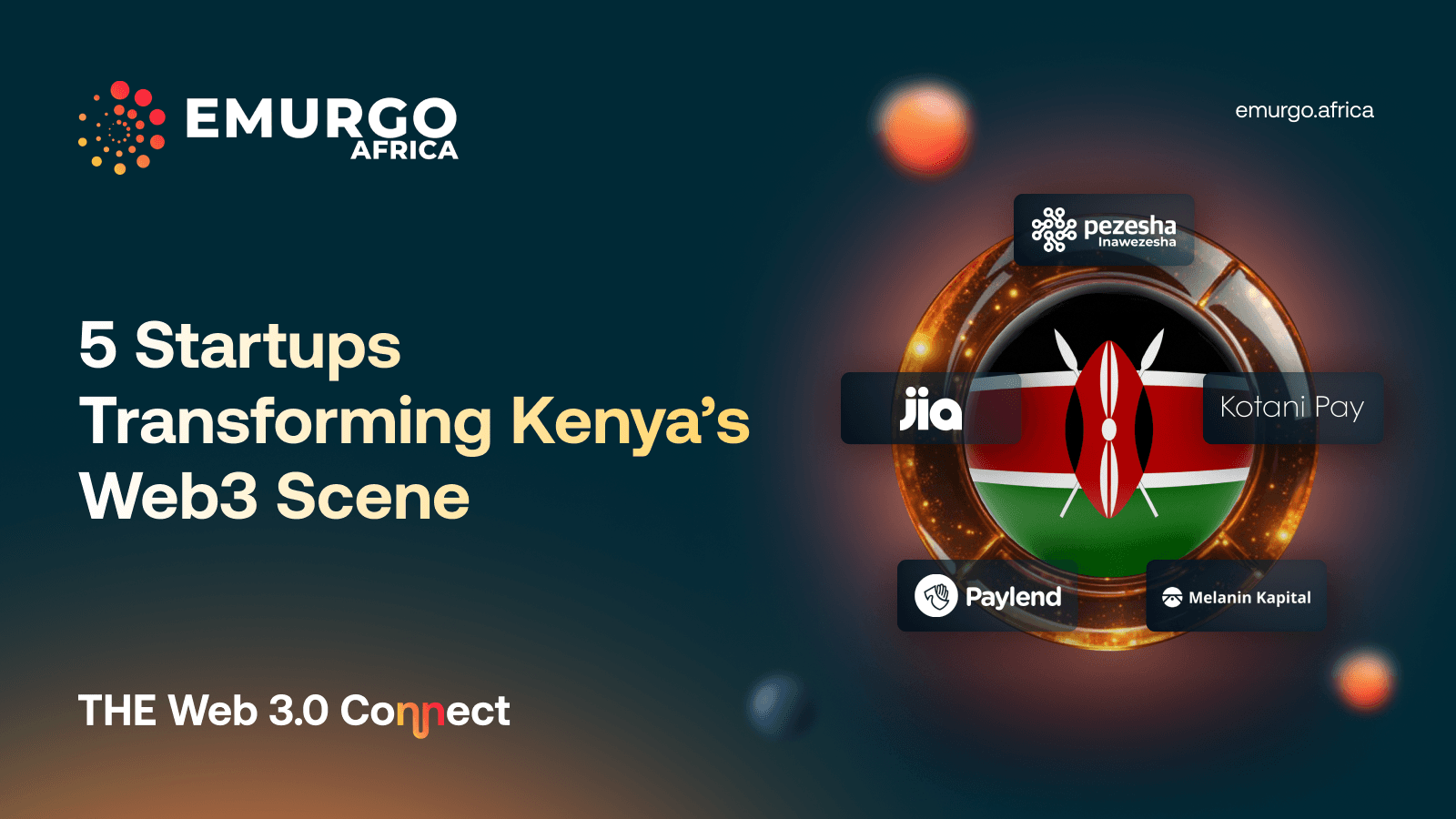By Shogo Ishida and Yosuke Yoshida, Co-CEOs, EMURGO Africa
Africa relies heavily on agriculture for its economic development. Up to 70% of the African workforce is in the agricultural sector, but changes in climatic conditions in recent years mean many farmers no longer record as high yields as they did two decades ago.
Despite agriculture contributing 23% to the continent’s GDP, limited access to credit and crop insurance, and inefficient supply chains have led to heightened food insecurity, with the Food and Agriculture Organization (FAO) data showing that one in every five Africans (282 million people) goes to bed hungry everyday. Only 3% of smallholder farmers in Africa have access to agricultural insurance, according to the World Bank.
However, African nations are harnessing blockchain to transform the delivery of agricultural insurance, guaranteeing heightened transparency, efficiency, and accessibility for farmers while improving the state of food security in the continent.
Key Takeaways:
- Uptake of agricultural insurance in Africa is low
- Crop insurance via blockchain is taking off in Kenya
- Smart contracts in Ghana and Uganda are facilitating parametric insurance solutions
Why Farmers are Struggling to Get Agricultural Insurance in Africa

The African continent still lags behind in agricultural insurance. With the largest percentage of farmers being smallholders (about 60% of the population), only 3% of them in Sub Saharan Africa have access to agricultural insurance cover.
Many smallholder farmers simply don't know about agricultural insurance or don't understand its benefits. Traditional insurance products are not well-suited for smallholder farmers as they are too complex, charge high premiums, or do not provide the type of coverage farmers need. Little effort is put in creating awareness and education on agricultural insurance.
There is also a lack of transparency in the insurance products offered to farmers. Farmers are therefore hesitant to trust insurance companies, especially if they have had negative experiences with other financial institutions. Insurance companies often overlook rural areas where most smallholder farmers live, making it difficult for them to access and purchase insurance products.
The insurance principle of proximate cause is also a challenge when deploying insurance policies for crop or animal cover. There are possibilities that a farmer experiences a loss but the insurance policy doesn't cover it because the specific trigger wasn't met.
For instance, the drought wasn't severe enough to claim payment. Insurers require extensive documentation and verification procedures before approving claims, leading to delays and frustrations for farmers who are already facing financial hardship. In some cases, disputes over claims arise, further complicating the claims process and eroding trust in insurance providers. This causes frustration and makes farmers question the value of agricultural insurance.
Many regions in Africa lack the necessary infrastructure and data systems to support effective agricultural insurance programs. Insurers often struggle to access reliable data on factors such as weather patterns, crop yields, and market prices, making it difficult to assess and mitigate risks accurately. Without this data, insurers may be hesitant to offer coverage, leaving farmers unprotected.
How Insurance on a Blockchain Works

Such challenges can be mitigated under a blockchain network, helping farmers across Africa reap more from their crop farming and livestock keeping activities.
In modern insurance practices, the insurance company typically uses centralized electronic ledgers in its internal systems to store such data as coverholder’s personal data, information relating to the risk covered such as type of crop grown, location, and loss history, and the policy terms. The insurer then ties this data with that obtained through other technological means such as mobile phones, sensors and satellites to get a real time analysis and insights while ensuring accuracy and confidentiality of clients’ information
While the process may only be visible to the centrally controlled data system storing the electronic ledger, incorporating blockchain technology means the ledger can be distributed to multiple computers in a network and users can view the entire process while its contents remain intact and unaltered, since the participating computers use algorithms to validate the data.
One key aspect of blockchain technology is the smart contracts concept. These are self-executing programs that are stored within the system and are triggered when the predetermined conditions are met. The execution of agreements is thus automated, such that participants in the agreement are certain of the outcome in a timely manner without involving an intermediary. For instance timely payments between stakeholders can be made when pre-set conditions have been met.
The term used here is index insurance, whereby a parameter such as drought levels, severity of floods, crop yields or rainfall intensity is used as a base to make payments without the need for further farm-level verification. A classical example is where payment is triggered if cumulative rainfall during the planting season in the covered location falls below say 200mm.
The use of blockchain for agricultural insurance comes with enormous benefits. First, it enables for timely settlement of claims, since the process is automated through smart contracts, thus minimizing delays and overhead costs. Smart contracts also ensure fairness and accuracy in claims processing, since their execution is triggered by fulfillment of pre-set conditions, thus eliminating the possibility of bias or error resulting from human intervention.
With blockchain, data collection is automated through integration of weather data from sensors, satellites, mobile phones and other sources, ensuring for real time analysis for insights on risks and claims eligibility.
With the technology, there is access to quality and incorruptible data. Although decentralized, the ledger folder storing the crucial data is maintained intact within the network. None of those accessing the folder can alter its contents once they are recorded. There is also enhanced traceability of processes and transactions. All these aspects enable data driven innovations for smart index insurance, thus transforming agricultural insurance to benefit both the farmer and the insurer.
Kenya is Moving Into the Blockchain to Insure Crops

In Kenya, Agriculture And Climate Risk Enterprise (ACRE Africa), an insurance intermediary providing risk management solutions in agricultural insurance and a beneficiary of the World Bank's One Million Farmers Platform (OMFP) is partnering with Etherisc, a parametric blockchain insurance platform to enhance the uptake of agricultural insurance products by addressing the derailing challenges. The company says it is working with Etherisc “to boost efficiency of existing insurance products with blockchain technology to reduce costs and improve attractiveness, profitability and reach by smallholder farmers.”
The partnership is exploiting the smart contracts concept, using weather as the proxy factor to offer weather index insurance product to farmers to cover them against drought and excessive rainfall. The insurance policies are registered as smart contracts by a user interface on a private blockchain.
The insurance product, known as Bima Pima, is packaged as a scratchcard and distributed at the start of an agricultural season. Partnerships with farm input companies has enabled ACRE Africa to bundle this insurance with farm inputs such as seeds and services like access to credit to increase farmer uptake. The micro insurance product is being offered to smallholder farmers for as little as $0.40 per month to enhance affordability, and farmers can receive up to 15 times of their premiums payment.
Primarily, the insurance is distributed through smallholder farmers who are trained as Village Extension Service Providers, and who also act as change agents to transfer the knowledge to their peer farmers. As of December 2021, the project had served over 12,567 farmers, with at least 511 farmers being able to receive mid-season payouts during the long rains.
Currently, the company is serving over 70,000 farmers in 15 counties. At a sufficient scale, the platform has the potential to slash the cost of issuing contracts by 41%, enabling reduction in premiums up to 30% and reducing claim cycles from three months to one week. ACRE Africa targets to serve over 1.2 million farmers under the Blockchain Climate Risk Crop Insurance platform.
Another notable project transforming crop insurance in Kenya is the Lemonade Crypto Climate Coalition, a pioneering blockchain-based parametric crop protection for subsistence farmers. Spearheaded by the Lemonade Foundation, this coalition provides vital protection to farmers' livelihoods affected by weather events in Kenya.
Upon the season's conclusion, eligible participants received instant payouts through smart blockchain contracts in 2023. Leveraging smart contracts facilitated swift cash transfers, eliminating the need for claims processing or human adjusters. This approach reduced costs and bypassed the often lengthy timelines associated with traditional procedures.
Joined by esteemed founding partners such as Avalanche, Chainlink, DAOstack, Etherisc, Hannover Re, and Pula, the Lemonade Crypto Climate Coalition introduced its nonprofit, immediate crop protection program to smallholder farmers at the beginning of the planting season. Nearly 7,000 farmers enrolled to safeguard their crops during the recent short rains season spanning from October 2022 to January 2023.
Farmers can easily enroll in the program, conduct transactions, and receive payments through their mobile phones, mirroring familiar banking and payment processes. These transactions generate smart contracts hosted on the blockchain. At the close of a growing season, area yield data is relayed to the application's smart contracts. In the event of adverse weather conditions leading to crop failure, an instant payout is triggered for farmers.
Smart Contracts in Ghana and Uganda Provide Parametric Insurance Solutions

In Ghana and Uganda, blockchain technology is facilitating the development of parametric insurance solutions tailored to the specific needs of farmers. Parametric insurance relies on predefined triggers, such as rainfall levels or temperature thresholds, to automatically initiate payouts without the need for time-consuming claims assessments.
In both countries, insurtech startup WorldCover uses blockchain to provide climate risk crop insurance to smallholder farmers to help them mitigate the adverse effects of climate change. Based in New York and Accra, the platform uses satellite imagery, on-ground sensors, mobile phones, and data analytics to create insurance options for farmers whose crops yields are affected adversely by weather events.
With a simple USSD dial or mobile application, farmers can create an account with WorldCover and input their data, select their preferred insurance plan, and use mobile money to make premium payments. This simplifies the process and access for farmers who may be located in areas with less access to insurance service providers. Claims are also filed from mobile phones and payment made through mobile money. The company categorizes smallholder farmers as those farming on 10 to 20 acres of land, and earning around $500 to $5000.
The company is also present in Kenya, serving over 30,000 farmers across the continent, and is looking to expand its operations to other countries. By combining blockchain with parametric insurance, farmers in these countries are better equipped to cope with the impacts of climate change and other external shocks, strengthening the resilience of the agricultural sector.
DISCLAIMER: The information in this content (website or other form) does not represent an offer or commitment to provide any product or service. The analysis, opinions and estimates expressed in this content are those of the respective authors, and may differ from those of EMURGO Africa and/or other EMURGO Africa employees and affiliates. Copying, re-publishing or using this material or any of its contents for any other purpose is strictly prohibited without prior written consent from EMURGO Africa.




